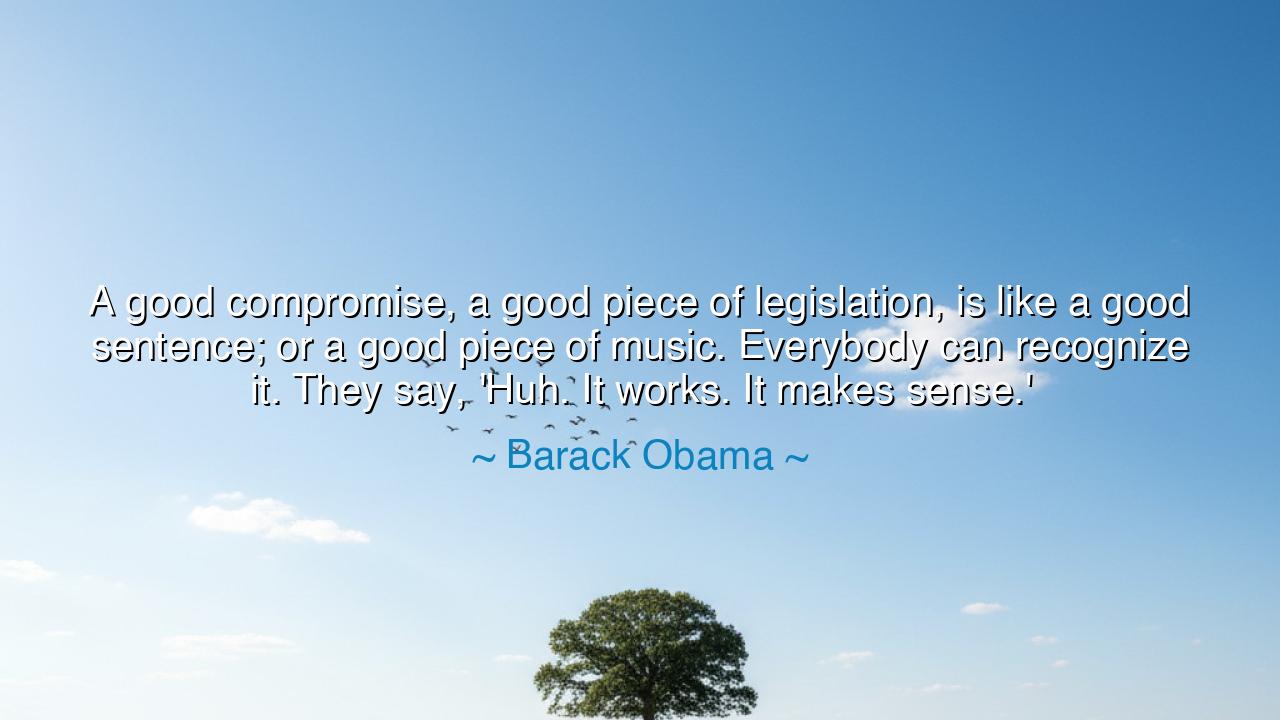
A good compromise, a good piece of legislation, is like a good
A good compromise, a good piece of legislation, is like a good sentence; or a good piece of music. Everybody can recognize it. They say, 'Huh. It works. It makes sense.'






The statesman Barack Obama once spoke these words of wisdom: “A good compromise, a good piece of legislation, is like a good sentence; or a good piece of music. Everybody can recognize it. They say, ‘Huh. It works. It makes sense.’” In this teaching lies a vision of harmony in human affairs. For just as a well-written sentence or a noble piece of music resonates with clarity and balance, so too must the laws and decisions that govern people’s lives. True compromise is not weakness, nor is it surrender—it is the art of blending discordant voices into a single sound that feels natural, just, and true.
The ancients knew this principle well. In the councils of Greece, men debated fiercely, yet the greatness of their democracy lay not in absolute victory, but in the forging of agreements that allowed the city to stand united. A good compromise is not an arrangement where all are left bitter, but a structure where different hopes find a place, much like different notes in a chord. Obama’s metaphor is timeless: as music brings harmony from many tones, and as a sentence brings meaning from many words, so does true compromise bring peace from many wills.
History gives us clear witness. Think of the Constitution of the United States, born in Philadelphia in 1787. The delegates were divided—some sought strong central authority, others demanded the sovereignty of states. Tempers burned, divisions deepened. Yet through patience, humility, and the willingness to yield without abandoning principle, they forged a document that has endured centuries. The legislation they created was not perfect, but it worked. Like a good melody, it struck a balance that could be recognized by all as something that “made sense.”
Obama’s words also remind us that compromise is not about pleasing everyone equally, but about creating something that functions, something recognizable as good by the human spirit. When a sentence is well-crafted, we need not argue over its grammar—we feel its rightness. When a symphony resolves, we do not debate its notes—we feel its harmony. Likewise, when a piece of law or policy is crafted wisely, even those who opposed it may nod, acknowledging: “Yes, this works.” This is the secret of enduring governance, and of enduring human cooperation.
Yet how difficult it is, in every age, to achieve such balance! Pride, ambition, and anger tempt us toward extremes. We forget that human life itself is built upon compromise: the give-and-take of family, the daily balance of work and rest, the unending negotiation between desire and duty. The one who despises compromise despises harmony itself, seeking only the shrill dominance of a single note. Obama’s lesson is therefore not only for leaders and lawmakers, but for all souls who wish to walk in peace with others.
The lesson is clear: seek compromise not as surrender, but as creation. Listen to the voices around you, not to silence them, but to find in them the threads of a greater design. When you speak, shape your words as a writer shapes a sentence—with clarity, rhythm, and purpose. When you act, seek the balance of a musician who knows that even dissonance, properly resolved, brings beauty. In this way, your choices will resonate, and others will say, “Yes. It works. It makes sense.”
Practically, this means entering each conflict with patience. Do not demand all, and do not yield all. Instead, search for the ground where truth and justice can stand together. In your family, in your work, in your nation, remember that harmony is born of many voices. Like a good writer or a good composer, polish your agreements until they carry balance, order, and grace.
Thus, let Obama’s words be carried forward: a good compromise is like a good sentence, like a good piece of music. It is recognized not because it pleases every desire, but because it carries the deeper beauty of balance. To live by this wisdom is to become not only a better citizen, but a better human being—one who brings harmony wherever discord threatens, and one whose choices, like music and poetry, will endure through time.






AAdministratorAdministrator
Welcome, honored guests. Please leave a comment, we will respond soon